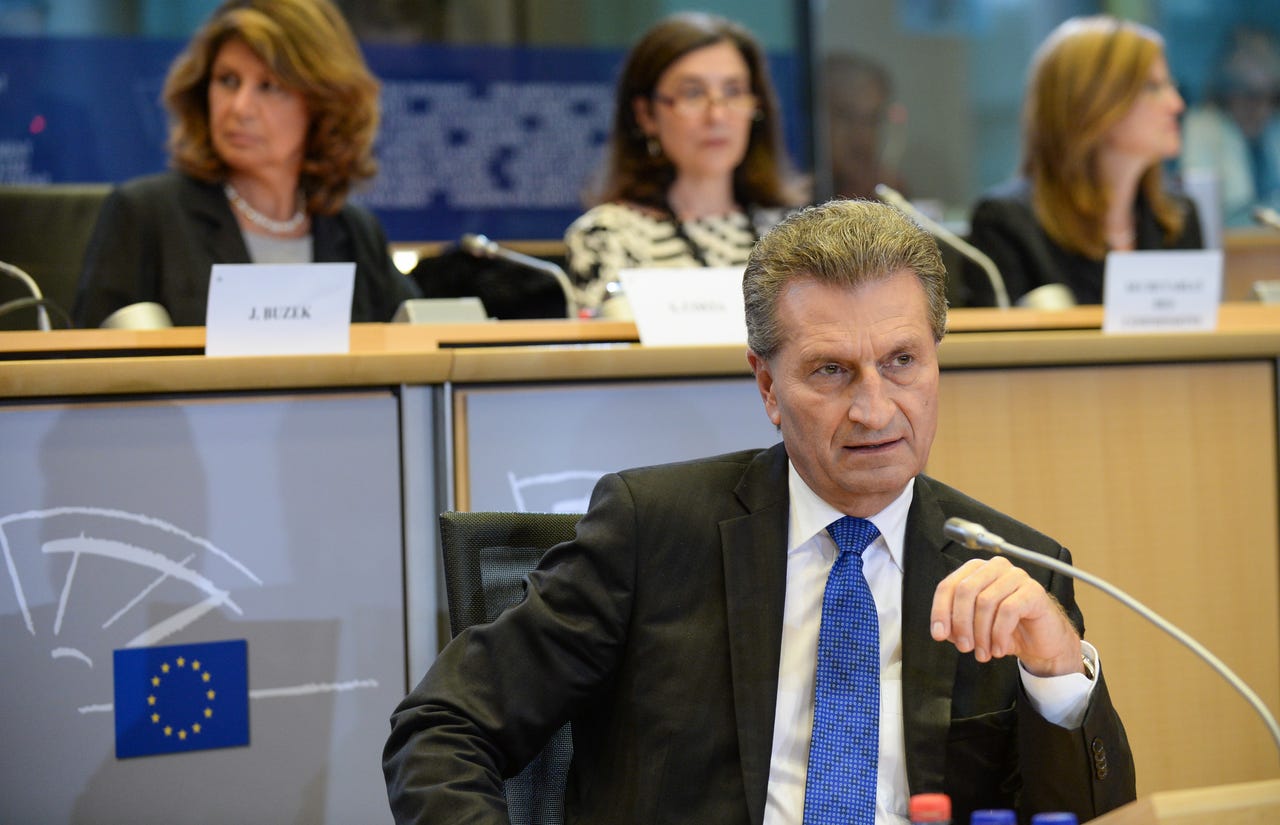Net neutrality and nude celebrity selfies: Are Europe's digital challenges in safe hands?


Think of it as a case of buy one, get one free. The European Commission — the EU's executive body — used to have only one digital commissioner, but starting in November, it will have two.
The pair that are set to replace outgoing commissioner Neelie Kroes couldn't be more different. Andrus Ansip, former prime minister of tech-savvy Estonia, is set to become the commissioner for digital single market, while Germany's Günther Oettinger, who has to convince people that he uses the internet "every day", will be the commissioner for the digital economy and society.
The pair's responsibilities over the next five years will include modernising Europe's copyright laws, developing Europe-wide net neutrality standards, and reforming rules for the continent's telecoms industry.
Earlier this month, the pair were grilled in separate parliamentary hearings, where they answered questions from the lower house.
In his hearing, Günther Oettinger — who has served as the commissioner for energy since 2010 and is from Angela Merkel's CDU political party — hammered home the need for better infrastructure and more tech education.
"The ICT brains of tomorrow need to have the courses available at school," he said, responding to a question about how young people can take advantage of opportunities in information and communications technology.
On telecoms, Oettinger signalled that he would be conducive to fostering a regulatory environment that encourages more consolidation. "On the global arena, EU players are not big enough," he said. "We have got to be able to hold our own with global players."
At other times during the hearing, Oettinger tended to be evasive, especially on copyright laws. Copyright has been a sensitive topic in the legislature since at least 2012, when the European Parliament rejected the ratification of the Anti-Counterfeiting Trade Agreement (ACTA), and one of Oettinger's big challenges in his term will be helping to reconcile Europe's dated copyright laws for an era where many digital works can be easily pirated. His responses to questions about copyright laws, though, were vague, and provided little indication about his actual intentions.
"I certainly want to get involved in the issue of copyright," Oettinger said. "I'll be happy to come back in a year or two years from now when I have drawn up a balanced proposal which is to the benefit of all stakeholders."
Oettinger seemed unwilling to take positions on other topics. On developing common European standards for cloud computing — something Kroes was a strong supporter of — he said that he would "like to take time to think about that, frankly".
In other, perhaps more problematic, ways, Oettinger came across as out of touch with the current realities of technology. When discussing the increasing opportunities for startups in Europe, for instance, he painted a rosy picture of a future world that has in fact already existed for some time: "In the future, the modern lathe is going to be an integral part of an automatic factory that will be controlled by digital means."
Likewise, when addressing a question about privacy rights, Oettinger said that celebrities whose nude photos have been leaked over the past few months had no expectation of privacy, because they are "stupid" and were "happy to put their nude photos on the internet" — seemingly unaware that none of the celebrities in question actively posted any of the nude photos publicly.
As a result, in a commentary piece, a writer for the newsmagazine Der Spiegel said that Oettinger is "likely to be overwhelmed by the office".
On the other hand, as somebody who was recently prime minster of one of the most technologically-progressive governments in Europe, Ansip will come into his new role with much more tech cred than Oettinger. And that showed in his hearing.
On net neutrality, a topic on which Oettinger was vague, Ansip was more equivocal. "All traffic in the internet must be treated equally," he said.
During his hearing, Ansip also took a stronger stance on privacy than Oettinger. Specifically, he opened the door to ending — or at least modifying — the 'Safe Harbour' agreement, which allows data sharing between the US and some European countries; to some critics, it helps facilitate surveillance by the NSA.
"Safe Harbour is not secure," Ansip said. "The agreement has yet to live up to its name."
#AskAnsip
At one point during the hearing, Julia Reda of Germany's Pirate Party asked: "Are you in, or are you out?" She wondered if Ansip was willing to field questions from people on the internet.
"The answer is yes," Ansip replied.
And indeed, this week on Twitter, Ansip encouraged the public to weigh in on his agenda for the next five years with the #AskAnsip hashtag. His responses in this forum perhaps better illustrate Ansip's views, but also show that he'll have a lot of consensus-building to do once he hits the ground.
When asked how he actually planned on implementing net neutrality legislation, for instance, Ansip responded that he believes there is a consensus in Parliament, but that he still needs "to convince Council".
When a Twitter user bemoaned that he couldn't "watch or listen to the same music, TV or movies in Sweden that are available in the UK", Ansip responded that "#geoblocking should not exist in a true Digital Single Market", but didn't clarify how this could be implemented.
Since their hearings, both Oettinger and Ansip have secured informal approval from the Parliament. The full slate of commissioners now must be officially voted on; the vote is set to take place on October 22. If all goes as planned the new commissioners will begin on November 1.